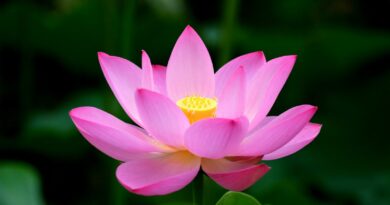KAMMA
Kamma
Sit in a way that’s pleasant. There’s pleasure that can arise from sitting, and there’s pain that can arise from sitting. There’s pleasure that can arise from lying down, and there’s pain that can arise from lying down. Why the difference? People can sit just like other people, but some people sit with pain and others sit with pleasure. What’s the cause? It comes from the fact that the goodness they’ve done isn’t the same.
Some people like doing good. Some people like doing evil: When they see the opportunity for evil, they’re happy. They do it with a sense of fun and enjoyment—but the victims of their actions suffer hardships. They get sad, miserable, resentful, vengeful. People do evil because they don’t understand what they’re doing. They think that there’s no such thing as evil, that the kamma of their actions won’t come back to them. But actually, our Lord Buddha gained awakening to just this issue: the issue of good and evil, the issue of kamma. He saw clearly with the discernment of his awakening that bad kamma really exists. If people do bad things, they’re bound to reap the results. The results of their actions don’t fade into nothingness. They’ll follow those people who did the actions so that bad things happen to them.
This is why people are born with bodies like other people—they have eyes and ears like other people, they live in the same world—but they’re not the same. Some people have lots of troubles; other people have lots of brightness in their lives. Some people have few illnesses; others have many illnesses. Even though they don’t want the illnesses, they’re bound to have them. Some people have lots of wealth. Some people have only a little wealth—even though they want wealth. They work hard, racing against the clock, but they don’t gain anything. Some people work the same number of hours, but rewards are not the same.
It depends on their actions—the goodness and evil they’ve done is different, and so they produce different results. Or as the Buddha said, “Action is what differentiates beings in terms of baseness and excellence.” Good actions direct people to live in good groups in good places where they prosper and experience pleasure. As for people who do actions that are evil and bad, when they leave this body their actions direct them to live in bad groups where they encounter difficulties and suffering. This is something that really happens. It’s not that these things don’t exist in the world.
We’re the same in that we’re living beings, but our bodies aren’t the same. The pleasures we experience aren’t the same. The mistreatment we’re subjected to isn’t the same. It’s because of the goodness and evil we’ve done. Even though we’re born as human beings like other human beings, the people who’ve liked to do good things have a complexion different from those who don’t. People who’ve liked to do evil have a different complexion, different level of intelligence, different habits, different manners.
The reason why some people like to do evil is because they haven’t associated with wise people, such as the Buddha. Or they haven’t listened to the Dhamma of wise people. They don’t know the Dhamma of wise people. This is why they don’t understand the causes of the pleasures and pains that arise in their own lives. They think that life comes from doing what you want, so they aren’t selective in what they do. They aren’t selective in what they look for. They don’t care if their actions cause loss or trouble for others. That’s because they haven’t listened to the Dhamma.
The Buddha felt a lot of pity for people like this, because it’s hard to help them—because they won’t accept help. They’re like overturned pots. No matter how much water you pour on them, no matter how much rain falls on them, it all flows away. It’s the same with people whose minds are overturned: They don’t accept any instruction as to what’s right and wrong. They don’t want to know about good and evil. They think that good and evil don’t exist, that they’re annihilated at death.
If their kamma were actually annihilated at death, it would be okay—but that’s not the way it is. And even before they die, they’re already suffering. It’s not the case that people who do evil will meet with suffering only after death. Other people don’t like associating with them or being their friends, because people who do evil don’t leave other people at peace. They themselves don’t have any peace or happiness. Even while they’re still in this life, even while they’re still human beings, they already suffer. No one wants to associate with them; good people can’t trust them. Wherever they go, good people don’t want to associate with them. And when good people don’t want to associate with you, how can you be happy?
We human beings find happiness in living with one another, with people who respect us, friends who respect us, with good parents in good families. If we get good friends and good teachers who give us the opportunity to study good things, we get an even greater opportunity to do good. We ourselves become more admirable and upstanding. We live with goodness in our lives. When we look back on a life in which we’ve done good, our hearts become bright over the fact that we have goodness, that we’ve been doing goodness all along. When we think of this, the heart has a sense of well-being and fullness—in spite of the fact that all things are inconstant, that they fall away even when we’ve done good.
But if people don’t do what’s good and skillful, and things fall away in that kind of life, if they try to think of their goodness to give themselves a sense of ease and refreshment, there’s nothing good to look back on—because it’s not there in the heart. They haven’t set their hearts on doing good: on being generous, observing the precepts, or meditating. When these things aren’t in their hearts, how can they look back on them? When they meet with troubles and problems, all they can look back on are the bad things they’ve done—and that simply adds to the problems. It’s like a burning fire to which you add more fuel. You’re simply giving it more energy to spread all over the place.
As for those of us who have done good—what’s called pubbe katapuññatā, having done good in the past—when we think back in the present moment, it gives us a sense of well-being, and that increases our sense of inner goodness. When we think of the gifts we’ve given, we feel cheerful. When we think of our precepts, and the fact that we haven’t oppressed anyone, human or animal, the mind is bright. We have friends. Even common animals can be friends with us, they can be happy with us, because we don’t oppress them. They can enjoy themselves with us. But as for people who’ve made themselves enemies: Not to mention common animals, even their fellow human beings won’t want to associate with them. They won’t want to get near, because such people are treacherous. No matter whose house they try to go to, no one will welcome them—because they’re a threat to the household.
This is the way things really are. Evil really exists. Goodness really exists. The good results of goodness really exist. They really bring you peace and happiness. And the goodness isn’t good only while you’re doing it. It becomes a habit that gets stored away in the heart, gets inscribed in the heart. It can’t easily be erased once it’s written into the heart.
Even after you die, that heart and mind remain. The goodness of the heart follows you as a treasure of the heart. Whatever state of becoming the heart goes to, its goodness looks after it, so that you’ll prosper in that location.
But it’s the same with evil. Once it’s inscribed in the heart, it’s hard to erase. It follows the person who has done it, to provide for that person so that that person will experience results in line with the action. There have been many, many examples of this.
This is why we all should be happy in doing good, and we should try to think back often on the good we’ve done, the times we’ve been generous, so that the mind will have something solid to hold onto as a refuge for the heart. Think back on your virtue as a refuge. Keep watch over your virtue as something solid for the heart and mind to hold onto. And try to meditate, looking carefully after your heart, so that you’ll have a good foundation in skillfulness. Your life will serve a purpose. It won’t pass by with nothing to show for it. It won’t be empty of purpose.
Wise people praise those who do good, because those who have done good will go to a good destination.
Now that you’ve heard this, try to remember it and set your heart on practicing in line with it.
And now receive the blessing.



